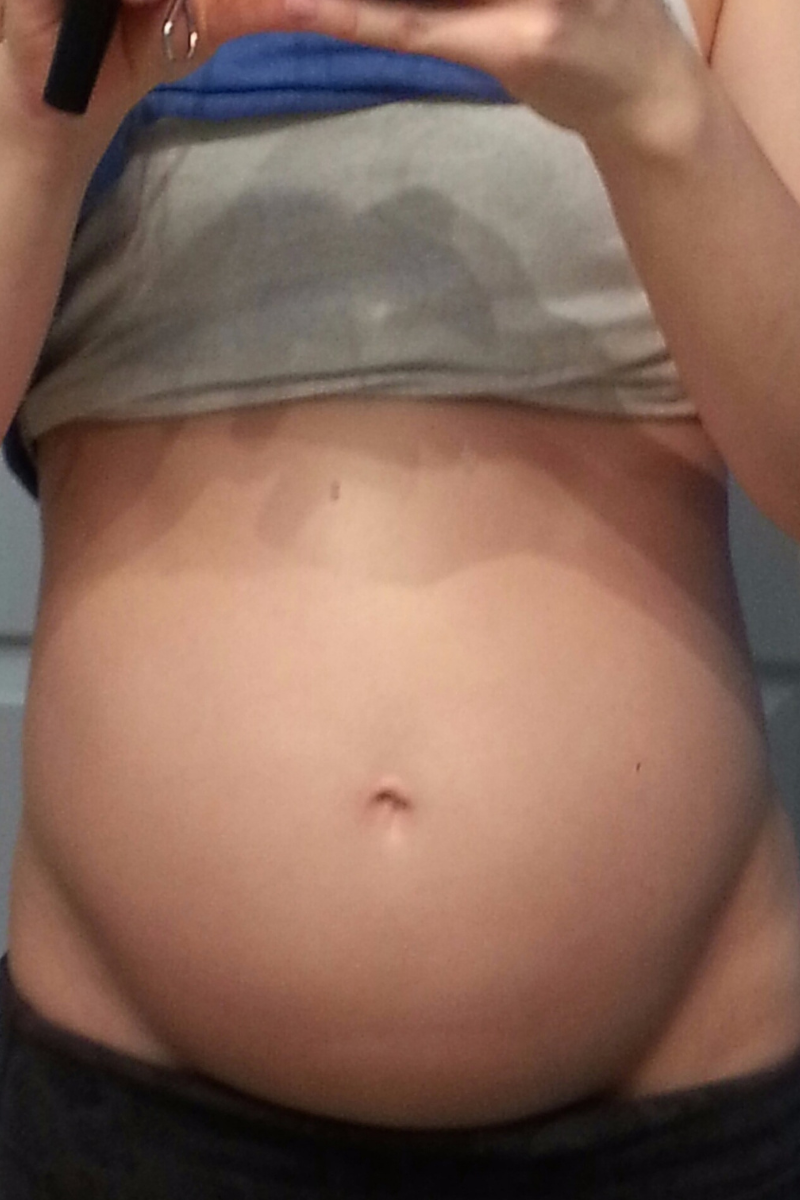You wake up with a flat stomach, but by afternoon, you’re so bloated you can’t button your jeans.
You’ve googled “SIBO belly” more times than you can count.
Maybe you’ve tried a low FODMAP diet, probiotics, even herbal antimicrobials—but the bloating always comes back.
This kind of unrelenting, unexplained bloating is something I see all the time in my practice. For some people, SIBO (Small Intestinal Bacterial Overgrowth) is the root cause. But here’s the thing: It’s not always SIBO—and even when it is, SIBO is rarely the whole story.
Let’s break down what “SIBO belly” really means, and explore what else might be going on when your gut won’t settle down—no matter what you try.
What Is “SIBO Belly,” Anyway?
“SIBO belly” isn’t a medical term—it’s a phrase many of my clients use to describe that tight, gassy, distended feeling that builds throughout the day, often after meals (and sometimes even after drinking water).
You might:
- Feel better in the morning, but look 6 months pregnant by dinner
- React to healthy foods like garlic, apples, lentils, or onions
- Notice your belly goes hard or round, but doesn’t “release” easily
- Feel pressure in your upper gut or under your ribs
If you’ve been experiencing this pattern, it makes sense to suspect SIBO—it’s one of the most common causes of these symptoms.
Yes, It Could Be SIBO
SIBO takes hold when bacteria overgrow in the small intestine. These bacteria ferment food before you can digest it, producing hydrogen, methane or hydrogen sulphide gas, which leads to symptoms like bloating, pain, constipation and diarrhea.
And here’s the wild part: up to 80% of people with IBS actually have SIBO.
That’s why SIBO is often the first place we look when someone comes in with long-term bloating, gut symptoms, and an IBS diagnosis that isn’t improving.
But what if you’ve already tried a SIBO protocol? What if the test was negative—or it helped a bit but didn’t solve everything?That’s when it’s time to widen the lens.
What If It’s Not SIBO?
Here’s the truth: SIBO can be a piece of the puzzle—but it’s not always the only piece.
In fact, many symptoms that look like SIBO are actually caused (or worsened) by something else entirely.
Let’s look at some common SIBO “mimics” or contributing factors that I often see in my clients:
Chronic Stress & a Dysregulated Nervous System
Your gut isn’t just a digestive organ—it’s deeply connected to your nervous system.
When you’re stuck in fight-or-flight mode, digestion slows way down. Food sits longer in your gut, fermentation builds up, and bloating follows.
And I’ve lived this myself.
I can think of a very specific time in my life when I finally learned how much chronic stress was actually causing my at-the-time daily bloating. As your typical Type A perfectionist, I was hitting the gym every morning at 5 a.m. before work, eating a “perfect” whole foods diet, and following the strictest gut health regime you could imagine…
Yet I still woke up every day looking a little pregnant. Nothing worked.
Then I went on a trip to Mexico and—for the first time in years—I actually relaxed. I slept in, skipped workouts, ate gluten and sugar (!!), and just let go.
And guess what? All of my GI symptoms went away.
That trip was a huge eye opener for me. It taught me that sometimes it’s not about what you eat—it’s about what state your body is in when you eat it. Until I calmed my nervous system, my gut never had a real chance to heal.
If you’re doing everything right but still bloated, your nervous system might be the missing piece. That’s why stress support is never optional in the work I do with clients—it’s foundational.
Dysfunctional Breathing Patterns
This one surprises a lot of people: the way you breathe affects your digestion.
Your diaphragm isn’t just for breathing — it plays a critical role in digestion, too. When you inhale deeply and properly, the diaphragm moves downward (like a piston), creating space for your abdominal organs to shift and for your stomach to comfortably expand as you eat.
But if you’re a chronic shallow breather — breathing into your chest instead of your belly — your diaphragm stays tight and high. It doesn’t fully descend, which means your stomach has nowhere to go when food enters.
So instead of expanding downward into relaxed space, your stomach pushes outward. This leads to visible, uncomfortable bloating immediately after eating, even if you’re eating small or healthy meals.
This dysfunctional pattern is sometimes referred to as abdomino-phrenic dyssynergia — a fancy term that means your diaphragm and abdominal wall aren’t working in sync. It’s especially common in people with gut-brain axis dysfunction and chronic bloating.
Shallow breathing can also lead to:
- Air swallowing (aerophagia)
- Increased abdominal pressure
- Poor vagal tone (reduced gut motility)
- And a nervous system stuck in “on” mode (fight-or-flight), which shuts down digestion
Here’s the good news: this is reversible.
Practices like diaphragmatic breathing, posture correction, nasal breathing, and nervous system regulation can drastically improve symptoms that seem like SIBO — but aren’t.
Constipation (Yes, Even If You Poop Every Day)
A lot of people are quick to say, “Oh, I’m not constipated—I go every day.”
But here’s the thing: you can poop daily and still be constipated if you’re not fully evacuating. And when stool builds up in the colon, even a little, it can lead to bloating, pressure, gas, and that “never quite empty” feeling in your belly. This often shows up as:
- Feeling like you never fully empty
- Needing to “go” again shortly after a bowel movement
- Bloating and discomfort immediately after eating or by afternoon
- Long time spent on the toilet or needing to push
And over time, incomplete evacuation slows transit time, allowing food to sit and ferment longer than it should. That fermentation leads to—you guessed it—bloating.If you’ve done all the right gut protocols and are still bloated, it may not be about food or bacteria—it might be about mechanics. And no supplement can fix that.
Chronic Inflammation
Sometimes, the bloating and digestive issues you’re experiencing aren’t just about the gut—they’re being driven by chronic inflammation somewhere else in the body.
Conditions like endometriosis, for example, are incredibly common in people with SIBO—and often go undiagnosed for years. Endo can cause inflammation, scarring, and adhesions in the abdominal cavity, which can physically impair gut motility and contribute to SIBO or SIBO-like symptoms.
Other inflammatory conditions that can impact gut function include:
- Autoimmune diseases (like Hashimoto’s or lupus)
- Chronic infections or post-viral syndromes
- Histamine intolerance or MCAS
- PCOS and estrogen dominance
This kind of systemic inflammation can make your gut more sensitive, reactive, and prone to bloating, even when your diet is clean and your digestion seems “fine on paper.”
In these cases, treating just the bacteria (or just the food) won’t work—because the real issue is that your whole system is inflamed and out of balance.If you’ve been addressing your gut without looking at the bigger picture, chronic inflammation could be the missing piece.
Why Getting the Right Diagnosis Matters
If you’ve been chasing bloating remedies for months or years—trying supplements, detoxes, and elimination diets—it can start to feel like your body is broken.
But the issue might not be your body.
It might just be that you’ve been trying to treat the wrong thing—or not the whole thing.
Testing for SIBO is helpful. But it’s not the end-all-be-all. That’s why in my practice, I take a whole gut approach—looking at the small intestine, the large intestine, digestion, inflammation, hormones, and lifestyle patterns all at once.That’s how we stop the cycle of temporary relief followed by rebound symptoms.
So… What Should You Do?
If you suspect you might have “SIBO belly,” here’s what I recommend:
- Test first – Don’t just jump into a protocol without testing.
Let’s figure out what’s really going on before treating something that may not even be the issue. - Zoom out.
Consider the bigger picture—motility, stress, structural issues, and gut ecology all matter. - Get support.
You don’t need to do this alone (and you shouldn’t have to guess). Working with someone who understands the gut as a whole system saves you time, money, and frustration.
Ready for Answers?
I work with clients using a root-cause, test-based approach to chronic bloating and gut issues.
Together, we’ll figure out whether SIBO is part of the problem—and what else your gut might be trying to tell us.





+ show Comments
- Hide Comments
add a comment